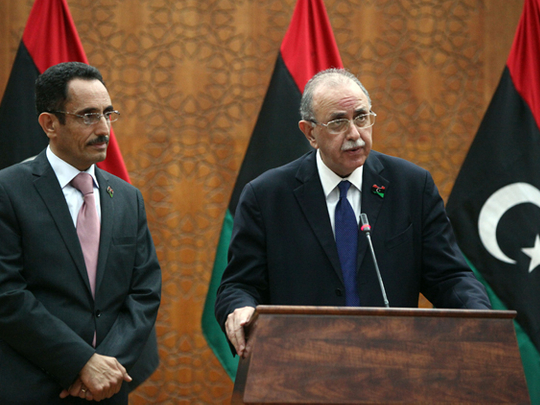
Tripoli: Libya's interim prime minister has announced the formation of a transitional government that will lead the oil-rich country until parliamentary elections are held next year.
Abdurrahim Al Kaib announced his Cabinet at a news conference in Tripoli on Tuesday night, sticking to a timeline for Libya's transition that the new leadership set out after declaring liberation on October 23.
The formation of the Cabinet clears the way for the next key step on that timeline: the election of a 200-member national congress by the end of June.
After toppling Muammar Gaddafi's regime in August, Libya's new leaders are still struggling to solidify their control over the fractured nation and to begin building state institutions that were nonexistent or weak under Gaddafi.
The Hague court
Tripoli: The International Criminal Court's prosecutor said Tuesday that Libya can put Muammar Gaddafi's son and one-time heir apparent on trial at home, but that The Hague court's judges must be involved in the case.
Luis Moreno-Ocampo was in Tripoli on Tuesday for talks with Libya's new leaders about their plans for Saif Al Islam Gaddafi, who was captured Saturday in southern Libya and is being held by fighters in the mountain town of Zintan, southwest of the capital.
"Saif is captured so we are here to ensure cooperation," Moreno-Ocampo told reporters after arriving in Libya. "If they (Libyans) prosecute the case, we will discuss with them how to inform the judges, and they can do it, but our judges have to be involved".
Red Cross
The International Committee of the Red Cross, meanwhile, visited Gaddafi's son there on Tuesday and said he appeared to be in good health. Steven Anderson, a spokesman for the Geneva organisation, said the visit "took place in accordance with the ICRC's customary working procedures" and all further findings would remain confidential.
The International Criminal Court, based in The Hague, Netherlands, has charged Saif Al Islam with crimes against humanity. But Libya's new leaders have said they will try him at home even though they have yet to set up a court system.
The ICC has also charged Gaddafi's former intelligence chief, Abdullah Al Senoussi, with crimes against humanity.
Crimes against humanity
Libyan officials have said Al Senoussi was captured over the weekend and is being held in the southern city of Sabha, although Libya's interim prime minister could not confirm the report.
Rights groups have called on Libya to hand both men over for trial in The Hague, and Moreno-Ocampo stressed that even if Libyans want to try the two men in Libya they must still cooperate with the world's first permanent war crimes tribunal.
Libya is obliged by a Security Council resolution to work with the court, but that does not necessarily preclude a trial in Libya. If Libya's National Transitional Council can convince judges in The Hague that the country has a functioning legal system that will give Saif Al Islam and Al Senoussi a fair trial on substantially the same charges as Moreno-Ocampo filed, then the ICC could declare Moreno-Ocampo's case inadmissible and turn it over to Libya.
"The International Criminal Court acts when the national system cannot do it," Moreno-Ocampo said. "That's why we are here, to understand what they are doing."
Crucial step
In a statement before his arrival, Moreno-Ocampo called the arrest of Saif Al Islam and Al Senoussi "a crucial step in bringing to justice those most responsible for crimes committed in Libya".
Libya's new leaders have not yet established a functioning court system, and have been struggling to put together a new transitional government since Gadhafi's fall. Later Tuesday, interim Prime Minister Abdurrahim Al Kaib was expected to announce the members of his new Cabinet.
Pariah
Saif Al Islam, who was once the face of reform in Libya and who led his father's drive to emerge from pariah status over the last decade, was captured Saturday by fighters from the small western mountain town of Zintan who had tracked him to the desert in the south of the country.
He was then flown to Zintan, 150km southwest of Tripoli, where he remains in a secret location.
In new video footage taken the day of his capture and obtained by The Associated Press, Saif Al Islam warns his captors that Libya's regions, which united to oust Gaddafi, will turn against one another "in a couple of months or maximum one year," suggesting the country will descend into infighting.
Competing revolutionary factions
There have been signs in recent months of growing tensions among Libya's powerful regions, and even after Gaddafi's fall in August and after his capture and killing in October, the country's numerous and sometimes competing revolutionary factions have refused to disarm, raising fears of new violence and instability.
The regions, backed by bands of armed fighters, are able to act autonomously, even on issues of the highest national interest.
In the video, revolutionary fighters stand around Saif Al Islam, who is seated in a green chair. Three of his fingers are heavily bandaged, and he occasionally winces from the pain.
In another video briefly posted by his captors on YouTube, he said the injury to his hand - which raised speculation he might have been abused - was from a Nato airstrike a month ago. But it was impossible to know if he was speaking truthfully or under duress.












